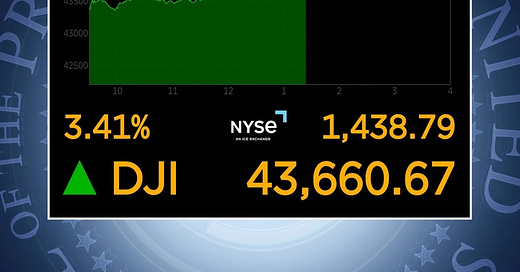A Watched Market Crash Pot Never Boils
The stock market will crash as a result of policy the last few years. The left will use it as a clarion call to blame President Trump.
I was thinking today about my prognostications over the last year regarding the stock market, and the old phrase “a watched pot never boils” came to mind. The lesson is simple: the more you focus on something you’re waiting for, the less likely it is to happen. It’s only when you stop paying attention that things unfold as you may have wanted or predicted.
Psychologist Carl Jung had a similar phrase: “What you resist persists.” The lesson there is similar—stop fighting “it” and whatever “it” is, will just happen.
Along those lines, I shouldn’t even be writing about the potential for a market crash at all. My readers know that I’ve talked about it extensively over the last two years and eventually gave up on trying to time when it would happen. Eventually, at some point, I even accepted I could be wrong, despite the unforgiving math of 5% interest rates applied to the largest debt bubble in history, in my mind, making the thesis all but a guarantee.
To be honest, over the last six months or so, I haven’t really even wasted too much brainpower thinking about the overall market, instead focusing on individual names and ETFs that I think could benefit from industry, political, geopolitical, and some macroeconomic trends.
Then today, I was watching an appearance that Eric Trump made on Fox News a week ago, right after the election. In it, he cited a surge in the stock market as a positive signal after his father won the election. And when considered one-dimensionally, he’s right—stocks surged after the election on expectations of lower taxes and less regulation. That makes sense.
But after the interview ended, my inner realist started gnawing at me. All I could think was, “Eric Trump is gonna look like a fucking moron in very short order once economic reality catches up to the market.”
And with that, I had exhumed the corpse of my thesis about a market crash and activated my inner fundamental analyst, channeling Homer Simpson when he famously said:
“All right brain. You don't like me, and I don't like you but let's just do this and I can get back to killing you with beer.”
Then, the statements made by Jerome Powell to end last week started echoing in my brain. For those who missed it, Powell basically came out and said the Fed isn’t going to rush cutting rates. "The economy is not sending any signals that we need to be in a hurry to lower rates," Powell said.
"The strength we are currently seeing in the economy gives us the ability to approach our decisions carefully. Ultimately, the path of the policy rate will depend on how the incoming data and the economic outlook evolve,” he added.
From a fundamental standpoint, I had given up on caring about how quickly the Fed cut rates months ago. That’s because if you believe in the fundamental case that positive or near-positive real rates are going to cause the gears of the economy to grind to a halt once people’s credit lines are tapped and personal savings have evaporated, it won’t matter whether the federal funds rate is 2.5% or 5%. The only thing that will matter is that they’re not at 0% or negative, which is likely where they would need to be to blow more air into our economic balloon.
Putting that aside, one tailwind the market has had behind it has been psychological—the expectation of cutting rates in a timely and systemic fashion. This behavioral signal doesn’t tangibly improve people’s current financial situation, but it gives them hope - hope that if they can make one more month of bills or fake one more quarter of investment marks, relief will eventually come down the pipe, and our economic Ponzi scheme will implode in an orderly fashion, as opposed to a chaotic fashion.




